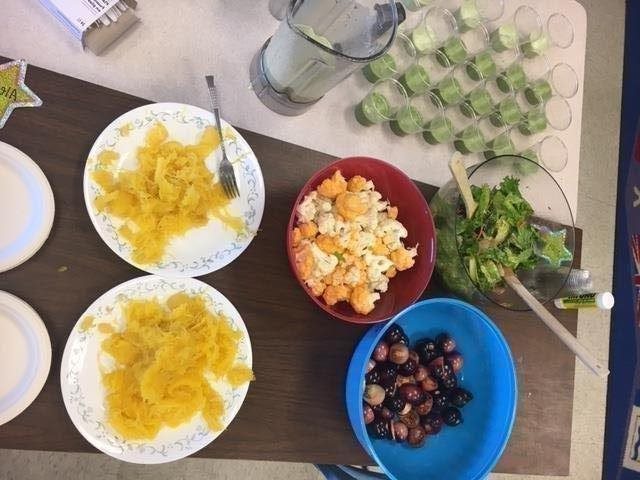Reducing Food Loss and Waste - A Dietitian’s Role

By Janelle Hatch, MHSC, RD | March 5, 2018
As a dietitian in Public Health, working on food security and food systems, I became involved in local initiatives to reduce food waste in the community through retail food rescue programs. Just this year, the
Food Rescue Project of the
Food Share Network became established and is rescuing food from a number of grocery stores that would otherwise go into composting or garbage - like veggies and fruit that are “imperfect” in appearance or slightly past their “best use” time. These foods are sorted by volunteers in a large warehouse equipped with cold storage and redistributed to schools, First Nations communities, community centres and food banks in our region. The food is then being distributed directly to individuals and families and used in cooking and meal programs. Approximately 4,000 pounds of food are being collected and redistributed daily through this program.
Another wonderful initiative in my community, the Fruit Tree Project, rescues food from fruit and nut trees that would otherwise go to waste. A local non-profit organization called
LifeCycles has been organizing this program for many years, putting together teams of volunteer pickers to travel around the region during harvest season and pick fruit and nuts from trees on public land and in people’s backyards who have registered their trees to be picked. The fruit and nuts are divided between the volunteers, donated to local community programs and used to make value-added products which are sold by the non-profit to keep the project running year after year. This program is another local example that reduces food waste in our community while benefiting community members.
I do not recall learning about food loss and waste in my dietetic training; now it’s being talked about in our communities and around the world. Food waste is a loss that impacts nutrition, economics, social norms and climate change; it’s complex and multifaceted, linked with many systems and stakeholders. Food loss and waste happens all along the food system chain from production to the end consumer.
What is happening globally to reduce food waste?
The Food and Agriculture Organization of the United Nations (FAO) launched a #
Zero Hunger campaign, France banned food waste from supermarkets, and Denmark
guides consumers to shop wisely and use all foods purchased. In South Korea, households pay fees based on how much food waste is thrown away.
Check out these resources for a start – there are lots more like them!
Fast facts on food loss and waste
What can dietitians do to reduce food waste?
In my experience, I think we can be partners, communicators, animators, promoters, collaborators and advocates. We can join networks in our communities to bring about change; we can develop programs and initiatives that value a strong local food system and work to reduce food loss and waste. We can do this personally and professionally, as volunteers in our communities. Dietitians are diverse in their strengths – our roles can look different according to where we work and live. We can work to reconnect people to their food and equip them with strategies for eating in more healthy and sustainable ways.
Beyond our efforts to impact individuals and communities, this is also an important time to effect systemic change. We can advocate for strong national policies and guidance, addressing issues of food loss and waste through the federal government’s
Healthy Eating Strategy, new Dietary Guidance and a new suite of
Canada’s Food Guide tools, and
A Food Policy for Canada.
Food is a vital connector; we can harness the value and power of food to raise awareness and tackle the issue of food loss and waste in Canada. I challenge you to think about these questions:
- How can we as dietitians in communities and workplaces across the country unite our voices for reductions in food loss and waste?
- Who could be our partners in this work?
- Do you know of programs or initiatives within your community that impact food loss and waste?
- Are you involved in these programs or do you promote them through your work as a dietitian?
I would love to hear your thoughts. Let’s start a dialogue about food loss and food waste. My email address is
janelle_rondeau@hotmail.com.
 Janelle Hatch is a Registered Dietitian in British Columbia with a Masters degree from the University of Toronto. She has been practicing as a dietitian in Public Health for more than 10 years. Her areas of interest include food systems, food security, food literacy and healthy schools. Her role in Public Health is focused on healthy schools and she balances this with contract work and volunteer time focused in the other areas.
Back to Practice Blog
Janelle Hatch is a Registered Dietitian in British Columbia with a Masters degree from the University of Toronto. She has been practicing as a dietitian in Public Health for more than 10 years. Her areas of interest include food systems, food security, food literacy and healthy schools. Her role in Public Health is focused on healthy schools and she balances this with contract work and volunteer time focused in the other areas.
Back to Practice Blog